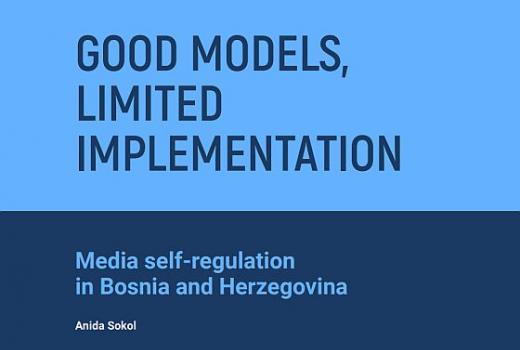Good models, limited implementation: Media self-regulation in Bosnia and Herzegovina

Good models, limited implementation: Media self-regulation in Bosnia and Herzegovina
Anida Sokol
Publisher:
MEDIACENTAR Sarajevo and Peace Institute
2023
Self-regulation of the media represents an agreement of media professionals to apply rules of the profession that were created within the media community.
In order for journalists and editors to adhere to rules that are both morally and professionally binding, it is first necessary to develop the awareness and responsibility of media professionals and media organisations themselves, but also to foster a supportive environment that includes, among other things, a strong media and advertising market, progressive media policies and mechanisms that protect the independence of the media, as well as a media and information literate audience. In Bosnia and Herzegovina (BiH), with a weak advertising market; an insufficient legal framework which, among other things, does not regulate the transparency of media ownership or require a mandatory register of online media; and significant political pressure on the media, self-regulation does not have a large reach.
Despite a well-established model of self-regulation of online and print media and changes to the Press and Online Media Code that reflect the trends and challenges in the digital sphere, violations of professional standards occur frequently. The Press and Online Media Code is breached even by members of the Press and Online Media Council of BiH, while numerous anonymous portals operate in BiH over which the Press and Online Media Council has no influence. Most media do not have their own editorial guidelines, ethical standards are rarely discussed in the media community and in newsrooms, and responsible and professional journalism is rarely encouraged. The Journalists’ Council of Honour of the BiH Journalists’ Association is not active and the public service broadcasters do not have an ombudsperson or similar body to address cases of breaches of the public services’ editorial principles.
In order to achieve an adequate level of professional media reporting through self-regulation, two-fold action is necessary: strengthening self-regulation in the media community and newsrooms, and working to achieve better legal
frameworks and mechanisms for protection. It is, therefore, necessary to strengthen the capacity and work of the Press and Online Media Council and to develop sustainable models for financing it. It is necessary to restart the work of the Journalists’ Council of Honour, which would decide on cases of violation of the BiH Journalists’ Honour Code. The regulator and the selfregulator could carry out occasional monitoring of media content; all decisions of their committees and of bodies within the public services should be transparent and announced in a timely manner and there should be a system of appeals against these decisions. The public services should introduce an ombudsperson for complaints lodged by citizens and employees regarding media content and the work of these media houses. Media organisations might hold occasional public discussions on ethical guidelines and the media might hold regular editorial meetings on ethical dilemmas and define and apply their own editorial principles.
At the same time, there is a need for progressive media policies, a media and information literate audience and a developed and protected media market. Due to the deep political influence on the media, it is important to design
mechanisms to prevent political influence on the work of broadcasters and regulators and interference in the appointment of directors and other persons in decision-making positions. It is necessary to create a register of online media and adopt a law on transparency of media ownership. Models for the introduction of co-regulation might potentially be considered, according to which the regulator would regulate those areas where self-regulation mechanisms are not effective, such as protection against non-transparent advertising. Finally, a developed awareness of journalists’ and editors’ professional responsibility is needed, as well as professional consequences for deviation from ethical rules – warnings, loss of credibility and loss of audience.
The publication can be downloaded here.
Publications from other countries of the Western Balkans and Turkey will be available on the SEENPM website.




